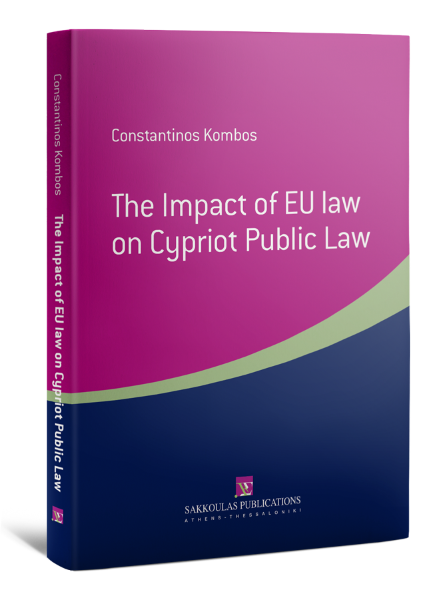K. Kompos, The Impact of EU law on Cypriot Public Law, 2015

The book adopts a critical yardstick and focuses on the implementation of fundamental principles of EU law by the Cyprus courts and places the emphasis on the field of public law. The approach of the Supreme Court of the Republic of Cyprus as to the constitutional principles of EU law (principle of the supremacy and direct effect) is thoroughly analyzed with reference to the relevant national case law and has as compass the established case law of the CJEU. The same approach is applied in relation to the structural principles of EU law (duty of interpretation and preliminary references). Moreover, the book examines two case studies in order to evaluate the impact of the case law of the Supreme Court in specifically complex areas of EU law (data retention and the free movement of members of EU citizens' family). Overall, the monograph identifies and explains the EU related jurisprudence of the Supreme Court and makes specific suggestions for improving the Cypriot approach. Furthermore, the analysis is placed in the broader context of Cypriot public law and the conclusion reached identifies systemic deviation from the traditional approach of the Supreme Court in other areas of public law. The work is essential for every student of Cypriot public law and EU law and is useful for anyone engaging in the study of the coexistence of national and supranational legal orders.
----------------------------
To βιβλίο εστιάζει με κριτική διάθεση στην εφαρμογή των θεμελιωδών αρχών του δικαίου της ΕΕ από τα Κυπριακά Δικαστήρια, με έμφαση στον τομέα του δημοσίου δικαίου. Η προσέγγιση του Ανωτάτου Δικαστηρίου της Κυπριακής Δημοκρατίας ως προς τις συνταγματικές αρχές του δικαίου της Ένωσης (αρχή της υπεροχής και του άμεσου αποτελέσματος) αναλύεται διεξοδικά με αναφορά στην σχετική νομολογία και με πυξίδα την πάγια νομολογία του ΔΕΕ. Η ίδια προσέγγιση εφαρμόζεται και ως προς δομικές αρχές του δικαίου της ΕΕ (σύμφωνη ερμηνεία και προδικαστική παραπομπή), ενώ το βιβλίο εξετάζει και δυο ειδικές περιπτώσεις όπου παρουσιαστήκαν προβλήματα στην Κυπριακή έννομη τάξη (διατήρηση τηλεπικοινωνιακών δεδομένων και ελεύθερη διακίνηση μελών οικογένειας πολιτών της ΕΕ). Το βιβλίο εντοπίζει και εξηγεί την νομολογία του Ανωτάτου Δικαστηρίου και προβαίνει σε συγκεκριμένες εισηγήσεις για την βελτίωση της Κυπριακής προσέγγισης. Επιπλέον, η ανάλυση τοποθετείται στο ευρύτερο πλαίσιο του Κυπριακού δημοσίου δικαίου και εντοπίζεται συστημική απόκλιση ειδικά ως προς την εφαρμογή του δικαίου της ΕΕ. Το έργο είναι απαραίτητο για κάθε μελετητή του Κυπριακού δημοσίου δικαίου αλλά και του δικαίου της ΕΕ.
Edition info
Table of contents +-
Acknowledgements
Table of Cases
Chapter One - Introducing the Study
1. Creating the Analytical Framework
Chapter Two - The Cypriot Constitutional Setting: Peculiarities and Idiosyncrasies
Introduction
1. The Cypriot Constitutional Context
1.A. Introducing the Issue
2. A Synopsis of the Constitutional Features of the Cypriot legal order
2.A. Framework Factors
2.B. The Constitutional Provisions
3. The landmark ruling in Ibrahim: introducing the doctrine of necessity
3.A. Doctrine of Necessity: Theoretical Foundations
3.B. The Most Important Decision in the Cypriot Legal Order: the landmark ruling in Ibrahim introducing the doctrine of necessity
4. The Subsequent Application: Elasticity and Lack of Systematisation?
4.A. Administrative Decisions (adopted prior to the legislation that would invoke the doctrine of necessity)
4.B. Law with Corrective Effect Adopted but Not Specific Enough-Strict Scrutiny
4.C. Signs of Elasticity in the Approach of the Supreme Court-Selective Review
4.D. Reverting back to Scrutiny
4.E. The Time Factor: How Long Can it Take?
Conclusion
Chapter Three - The Supreme Court and Comparative Law: The Special Case of the ECHR and the ‘Catholicity’ of the Cypriot System
Introduction
1. The Cypriot Legal System as a Mixed System: the Public Law Example
2. Comparative Law: The Constitution Construed in the Light of International Law and the Special Case of the ECHR
2.A. The Formal Position of the ECHR and the History of Human Rights in the Cypriot Constitution
2.B. The Approach of the Supreme Court towards the ECHR
2.C. Going Beyond the ECtHR
Conclusion
Chapter Four-The Fundamentals of EU Law (I): The Principle of Supremacy
Introduction
1. The ECJ’s/CJEU’s Dimension of Supremacy of EU law
1.A. The Van Gend en Loos Decision
1.B. The Decision in Costa v. ENEL
1.C. The Aftermath for Supremacy of EU law: Defining the Meaning of Supremacy
1.D. The Recent Developments
2. The Decision that Formed a Constitutional Amendment: Attorney General of the Republic v. Costas Constantinou
2.A. The Normative and Judicial Approach Prior to the 5th Amendment of the Constitution
3. The Response at the Normative Level: the 5th Constitutional Amendment Comprehensively Incorporating the Principle of Supremacy of EU law
3.A. Approach in General and Article 1A
3.B. Amending articles 11, 140, 169 and
4. The Application of the Principle of Supremacy of EU law by Cypriot Courts
Conclusion
Chapter Five-The Fundamentals of EU Law (II): The Principles of Direct Effect and Indirect Effect
Introduction
1. Direct Effect, Indirect Effect and the Supreme Court: Expanding the Effect of EU law
2. Categories of Application of Direct and Indirect Effect
2.A. Category A: EU Norm V. National Law
2.B. Category B: Constitution v. EU norm and National Implementing Norm
2.C. Category C: National Implementing Norm v. National Norm
3. Case Study: The Supreme Court’s Approach towards Directive 2004/38
Conclusion
Chapter Six-The Fundamentals of EU Law (III): The Preliminary Reference Procedure
Introduction
1. The Applicable National Legislative Framework and the EU rules on Preliminary References
1.A. Introducing the Preliminary Reference Procedure
1.B. EU Rules on Preliminary References
1.C. The Applicable National Legislative Framework
2. The Judicial Approach: Cases where a Preliminary Reference was Contemplated But Not Submitted
2.A. Netmed and the Unsteady Foundations
2.B. Motilla and the Obligation to Refer: Excluding Preliminary Reference
2.C. Motilla and its Aftermath: Cypriot Decisions and Case C-502/10 Mangat Singh
2.D. Applying the Netmed Approach
2.E. The Supreme Court and other Cases were Preliminary Reference was Discussed
3. Making the Reference: Clarity of Approach?
3.A. Symvoulio Apochetefseon Lefkosias v. Anatheoritiki Archi Prosforon
3.B. Michalias Saga
3.C. Cypra Ltd and Alpha Bank: A New Approach?
3.D. Papasavvas: First Instance Court Making a Reference and the Issue of Certiorari
4. The ‘Jurisdictional Situation’ Cases
Conclusion
Chapter Seven-Data Retention and the Approach of the Supreme Court
Introduction
1. The EU Data Protection and Data Retention Frameworks: CJEU’s U-Turn.
1.A. The Directive in Question
1.B. The Judgment of the CJEU in Ireland v. Council and Parliament
1.C. CJEU’s Judgments in Case C‑185/09, Commission v. Sweden and in Case 270/11, Commission v. Sweden
1.D. The Judgment of the CJEU in Joined Cases C-293/12 and 594/12, Digital Rights Ireland and Seitlinger and Others
1.D.A. The Background of the Cases
1.D.B. The Opinion of the Advocate General
1D.C. The Judgment of the CJEU
2. The Cypriot Example: Permanently Altering the Content of the Right to Privacy
Conclusion
Chapter Eight-EU Citizenship and Free Movement of Family Members
Introduction
1. General Legislative Framework: Characteristics and Shortcomings
1.A. General Approach
1.B. Transposition of Articles 2, 3 and 5 of the Directive 38/2004 into national law
2. The approach of the Supreme Court to the Directive and to Law 7 (I)/2007 (the scope of application, the key definitions of EU national and family members, reverse discrimination for Cypriot citizens)
3. The Approach to the Matter of Homosexual Couples
4. The Approach to the Criteria for Sufficient Financial Means
5. The Restrictions on the Right of Entry and the Right of Residence on Grounds of Public Policy, Public Security or Public Health
6. The Loss of the EU/Cypriot Citizenship in the context of the judgment in Rottmann
Conclusion
Epilogue
Bibliography





















